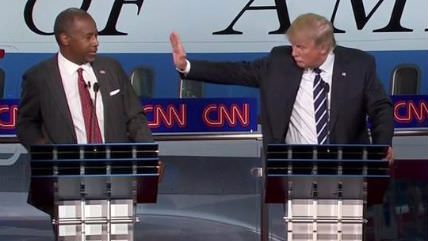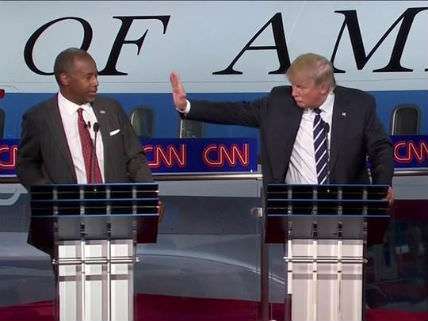Donald Trump: I'm the Only Candidate Who Opposed the Iraq War. Rand Paul: Uhhh
Ben Carson: Me too, but now it's totally different


Responding to a question at the CNN debate from Hugh Hewitt about what when he'd start announcing some of his military and foreign policy advisors, Donald Trump pivoted to the issue of judgment and, specifically the Iraq War. His answer, via a transcript of the debate from the Washington Post:
TRUMP: (inaudible) I'm—and I'm meeting with people that are terrific people, but I have to say something because it's about judgment.
I am the only person on this dais—the only person—that fought very, very hard against us (ph), and I wasn't a sitting politician going into Iraq, because I said going into Iraq —that was in 2003, you can check it out, check out—I'll give you 25 different stories.
TRUMP: In fact, a delegation was sent to my office to see me because I was so vocal about it. I'm a very militaristic person, but you have to know when to use the military. I'm the only person up here that fought against going into Iraq.
At this point, Rand Paul tried to chime in. After some cross-talk, Paul let Bush speak before him. Bush's answer was about an alleged (I can't find the quote or any reporting it) Trump comment that Hillary Clinton would have negotiated the best deal in Iran and how that showed poor judgment. Trump responded by pointing out George Bush's failures led to Barack Obama getting elected. "It was such a disaster, those last three months," Trump said, "that Abraham Lincoln couldn't have been elected." Bush responded by insisting his big brother "kept us safe," saying he sent a signal when he put his arm around a firefighter (on 9/11) sent a clear signal the U.S. "would be strong and fight Islamic terrorism."
Then Trump said he didn't feel safe, which brought the discussion to Barack Obama. Walker chimed in with a reference to Obama's ISIS JV squad comments and then talked about how the key issues was leadership and that he didn't back down during union protests of his reform efforts even though, said Walker, 100,000 demonstrators showed up at the state, he received multiple death threats, and was targeted by opponents of his reform efforts.
Remember the original question was about who exactly was advising Donald Trump, the current frontrunner for the presidential election, on issues of military and foreign policy. Trump's comment about news reports of his opposition to the Iraq war refers to an interview he gave Esquire in July 2004.
Finally Paul got to speak. He's relevant to the question because, despite Trump's assertion, he wasn't the only one on the stage who had opposed the Iraq War.
From the Post's transcript:
PAUL: The remark was made that there hadn't been anyone else on the podium opposed to the Iraq War. I've made my career as being an opponent of the Iraq War. I was opposed to the Syria war. I was opposed to arming people who are our enemies.
Iran is now stronger because Hussein is gone. Hussein was the great bulwark and counterbalance to the Iranians. So when we complain about the Iranians, you need to remember that the Iraq War made it worse.
Originally, Governor Bush was asked, was the Iraq War a mistake, and he said, "No. We'd do it again."
We have to learn sometimes the interventions backfire. The Iraq War backfired and did not help us. We're still paying the repercussions of a bad decision…
PAUL: We have make the decision now in Syria, should we topple Assad? Many up here wanted to topple Assad, and it's like—I said no, because if you do… ISIS will now be in charge of Syria.
At that point Paul had been cut off and, because he "invoked" Bush's name in his response, Bush got to respond. Bush called leaving Iraq a mistake again, and mentioned his August forieng policy speech at the Ronald Reagan library, where last night's debate was held, saying a comprehensive strategy to defeat ISIS needed "American leadership and engagement. The U.S., said Bush, didn't have to be the "world's policeman" but it did have to be the "world's leader." I don't know what that means.
Tapper then moved on to Marco Rubio, who gave his version of "the world's less safe because America is retreating schtick.
But there was one more candidate who says he opposed the Iraq war. Ben Carson chimed in:
CARSON: I haven't had an opportunity to weigh in on foreign policy, and I just want to mention that when the war, when the issue occurred in 2003, I suggested to President Bush that he not go to war? OK. So I just want that on the record.
Alas, it doesn't appear any lessons were learned:
And, you know, a lot of people are very much against us getting involved right now with global jihadism. And they refer back to our invasion of Iraq. And they seem to think that that was what caused it.
What caused it was withdrawing from there and creating a vacuum which allowed this terrible situation to occur. But it is very different from what is going on today. We're talking about global jihadists who actually want to destroy us.
Donald Trump thought their shared opposition to the war in Iraq deserved a high five. He got a handshake.


Show Comments (22)